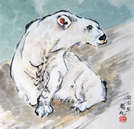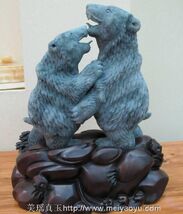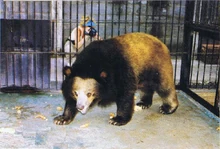(jkkjbkbj) Tags: Visual edit apiedit |
m (Adding navbox) |
||
| (11 intermediate revisions by 5 users not shown) | |||
| Line 1: | Line 1: | ||
| − | [[File: |
+ | [[File:Err.gif|thumb|1x1px]] |
| + | [[File:White bear.jpg|thumb|180x180px]] |
||
| − | From Red China prior to 1960, only rumors circulated of the Shennongjia white bear called “bai-xiong” by |
+ | From Red [[China]] prior to 1960, only rumors circulated of the Shennongjia white bear called “bai-xiong” (白熊) by locals. Four were captured and displayed in Chinese zoos. The creature apparently roams the mountain forests of southeastern Hubei Province and is thought to be a brown bear (U. arctos). Interestingly, the Shennongjia's description is quite similar to British Columbia's white-colored subspecies of black bear, known as the Kermode (''Ursus americanus kermodei''). |
| + | |||
| + | Kermodes also roam in densely forested mountains. Dense forested mountains share the possibility to harbor these mystery bears. |
||
== The Story == |
== The Story == |
||
| + | [[File:White Bear china.png|thumb|134x134px|Lin-Hua Wu's White bear, once part of the former Masterpiece Studioz LLC collection. "In Chinese painting the bear symbolizes strength and courage."]] |
||
| − | We were in a small village in western Red China. I stared at the bear foot in a sidewalk drug store. Clearly, it came from a brown bear (Ursus arctos), but where was this mystery bear from? In arid Qinghai province, there were no bears. It must have come overland on the ancient silk-road trade route—from who knows where. |
+ | We were in a small village in western Red China. I stared at the bear foot in a sidewalk drug store. Clearly, it came from a brown bear (Ursus arctos), but where was this mystery bear from? In arid Qinghai province, there were no bears. It must have come overland on the ancient silk-road trade route—from who knows where. |
| + | |||
| ⚫ | To learn the value of the bear to the locals, I asked my scientist friend if he could buy it. He looked at me with troubled eyes, searching for the correct words. Finally he spoke, his concern about alleged medicinal properties, “Dr. Jimers (Chinese mispronunciation of Jim) bargained the price down to $16 for the single paw. The whole bear was therefore worth over $100 on the local economy. A large sum to locals, and a significant threat to continued existence of bears. I wondered, how many bear species have gone extinct or will at the hands of modern people? |
||
| + | [[File:Bear white.jpg|thumb|214x214px|Two Chinese white bears. ]] |
||
| ⚫ | While an isolated pocket of wilderness may yield a new species of living bear, we have more immediate concerns including the alarming increase in fragmentation of existing bear populations. Isolated populations may suffer from a lack of genetic diversity, which ultimately impedes their survival. Even in relatively large protected areas, such as the Yellowstone ecosystem, genetic diversity is a concern. But of greater importance are the point source conflicts with humans, problems which include beehives, orchards, crops, livestock, garbage, pets, corridor blockage, and habitat destruction. These create threats that bears may not overcome. |
||
| + | |||
| + | == Also See == |
||
| + | -[[Bergman's Bear]] |
||
| + | [[File:Gmb.jpg|thumb|220x220px|The '''[[Golden Moon Bear]], '''another sighted cryptid bear from China.]] |
||
| + | -[[MacFarlane's Bear]] |
||
| + | |||
| + | -[[Qupqugiaq]] |
||
| + | -[[Golden Moon Bear]] |
||
| ⚫ | To learn the value of the bear to the locals, I asked my scientist friend if he could buy it. He looked at me with troubled eyes, searching for the correct words. Finally he spoke, his concern about alleged medicinal properties, “Dr. Jimers (Chinese mispronunciation of Jim) |
||
| + | -[[Northern Giant]] |
||
| ⚫ | While an isolated pocket of wilderness may yield a new species of living bear, we have more immediate concerns including the alarming increase in fragmentation of existing bear populations. Isolated populations may suffer from a lack of genetic diversity, which ultimately impedes their survival. Even in relatively large protected areas, such as the Yellowstone ecosystem, genetic diversity is a concern. But of greater importance are the point source conflicts with humans, problems which include beehives, orchards, crops, livestock, garbage, pets, corridor blockage, and habitat destruction. These create threats that bears may not overcome. |
||
[[Category:Cryptids]] |
[[Category:Cryptids]] |
||
[[Category:Cryptid Wiki]] |
[[Category:Cryptid Wiki]] |
||
| Line 13: | Line 28: | ||
[[Category:Asian cryptids]] |
[[Category:Asian cryptids]] |
||
[[Category:Ursine]] |
[[Category:Ursine]] |
||
| + | [[Category:Mammals]] |
||
| + | [[Category:Central Asia]] |
||
| + | {{CryptidsNavBox}} |
||
Latest revision as of 08:40, 17 June 2019


From Red China prior to 1960, only rumors circulated of the Shennongjia white bear called “bai-xiong” (白熊) by locals. Four were captured and displayed in Chinese zoos. The creature apparently roams the mountain forests of southeastern Hubei Province and is thought to be a brown bear (U. arctos). Interestingly, the Shennongjia's description is quite similar to British Columbia's white-colored subspecies of black bear, known as the Kermode (Ursus americanus kermodei).
Kermodes also roam in densely forested mountains. Dense forested mountains share the possibility to harbor these mystery bears.
The Story

Lin-Hua Wu's White bear, once part of the former Masterpiece Studioz LLC collection. "In Chinese painting the bear symbolizes strength and courage."
We were in a small village in western Red China. I stared at the bear foot in a sidewalk drug store. Clearly, it came from a brown bear (Ursus arctos), but where was this mystery bear from? In arid Qinghai province, there were no bears. It must have come overland on the ancient silk-road trade route—from who knows where.
To learn the value of the bear to the locals, I asked my scientist friend if he could buy it. He looked at me with troubled eyes, searching for the correct words. Finally he spoke, his concern about alleged medicinal properties, “Dr. Jimers (Chinese mispronunciation of Jim) bargained the price down to $16 for the single paw. The whole bear was therefore worth over $100 on the local economy. A large sum to locals, and a significant threat to continued existence of bears. I wondered, how many bear species have gone extinct or will at the hands of modern people?

Two Chinese white bears.
While an isolated pocket of wilderness may yield a new species of living bear, we have more immediate concerns including the alarming increase in fragmentation of existing bear populations. Isolated populations may suffer from a lack of genetic diversity, which ultimately impedes their survival. Even in relatively large protected areas, such as the Yellowstone ecosystem, genetic diversity is a concern. But of greater importance are the point source conflicts with humans, problems which include beehives, orchards, crops, livestock, garbage, pets, corridor blockage, and habitat destruction. These create threats that bears may not overcome.
Also See

The Golden Moon Bear, another sighted cryptid bear from China.
